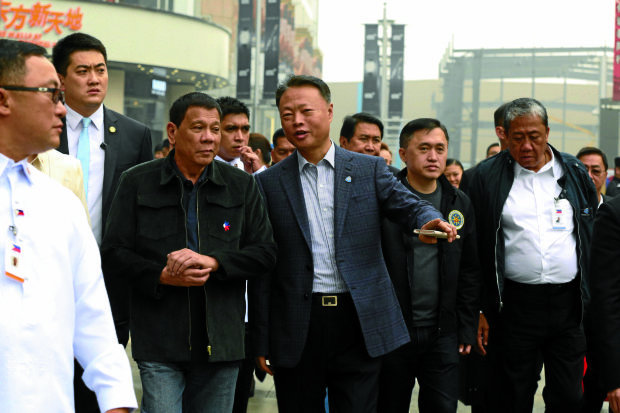Highlight the good news about China visit, not the bad, Tugade tells media

President Rodrigo Duterte is joined by Chinese Ambassador to the Philippines Zhiao Jianhua as they walk along Wangfujing Street in Beijing China going to Dadong Roast Duck Restaurant for a lunch on October 19. Also in the photo are Special Assistant to the President Christopher Go and Transportation Secretary Arthur Tugade. KING RODRIGUEZ/Presidential Photo
Transportation Secretary Arthur Tugade came to President Duterte’s defense yesterday, calling on the media to focus on the “good news” that came out of his state visit to China instead of the controversy spawned by his statement about “separating” from longtime ally the United States.
“[We] should highlight the good news—2 million [in potential] employment, our agricultural products can again enter China, the [potential] 1
million tourists, their planned additional flights to Clark and Davao. Why can’t we give emphasis to these?” Tugade told reporters Friday on the sidelines of the graduation of 400 volunteer traffic enforcers in Quezon City.
“What we see is the language that is not in line with others’ body language and rhetoric,” Tugade said, adding that “good news is good news.”
He said in Filipino: “Let us look at the good part of any project, not only the bad aspect… it’s like good news is not [newsworthy].”
The “bad aspect” was apparently is a reference to Mr. Duterte’s remarks before a gathering of Chinese and Filipino businessmen at a forum in the Great Hall of the People in Beijing where he delivered his strongest message yet against the United States.
What he meant
“In this venue, your honors, I announce my separation from the United States, both in military, not maybe social, [and] economics,” Mr. Duterte had said.
The President has since clarified his remarks, saying in an arrival press conference in Davao City that what he meant was a “separation of foreign policy.”
Contrary to Tugade’s observation, that good news was not deemed newsworthy, the media has reported on the investments expected from the President’s China trip before he delivered his controversial foreign policy statement. Since Wednesday the Inquirer has been reporting on the megadeals the China trip had generated.
Meanwhile, when Tugade was asked about the status of the plastic driver license cards with a five-year validity, the transportation chief fired back: “Eh, bakit naman sasabihin ninyo five years na wala namang lisensya. Bakit ganun? Kaya nga maghintay kayo ng lisensya nung papel pero magpasalamat tayo na meron nang five years (Why would you say five years when there are no licenses? Why is that? That is why you have to wait for the paper licenses but we must be thankful that it will be valid for five years).”
He did not elaborate.